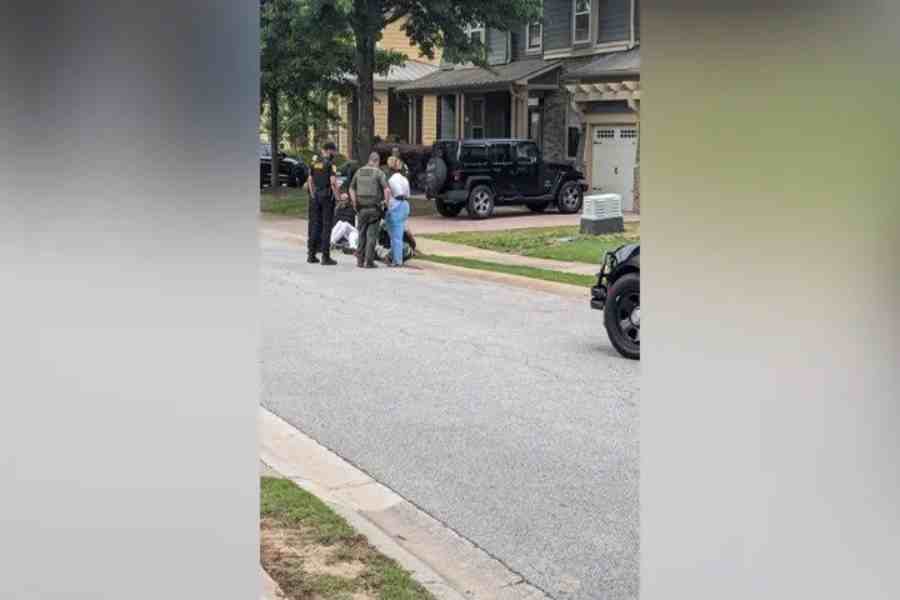
South Fulton, GA — A group of alleged squatters occupying a vacant home in South Fulton, Georgia, since Christmas has been forcibly evicted by local police, marking the latest chapter in a growing challenge of unauthorized property occupation across the state.
In a decisive response involving significant police presence, six individuals were detained, and a stolen vehicle was recovered at a residence on Caveat Court, situated in the Hampton Oaks neighborhood. The swift action by South Fulton police comes amid rising concerns from residents and the homeowners’ association about the apparent uptick in squatting activities in the area.
The Vice President of the Hampton Oaks Homeowners Association, Kendra Snorton, voiced her growing concerns about the group’s unsettling presence, revealing that the alleged squatters settled into the vacant property on Christmas Day.
The ringleader, often seen walking his dog around the neighborhood, maintained a courteous demeanor during interactions with residents, which created a deceptive facade of normalcy. Despite this, the squatter group’s presence fostered significant unease among the community.
Snorton emphasized that the anxiety stemmed from the lack of transparency about the group’s true intentions and identities. “We don’t know who’s living among us,” she noted, highlighting the distrust and discomfort caused by unauthorized individuals exploiting neighborhood amenities. She observed that squatters frequently used communal facilities, such as parks and walkways as if they were legitimate residents.
The situation grew more alarming when multiple instances of home break-ins were reported. Unauthorized occupants, exploiting the vacant properties, not only unsettled residents but also compromised the community’s safety and security. Snorton concluded that the unchecked movement of the squatters, combined with their access to neighborhood resources, left property owners feeling increasingly vulnerable and uncertain about the security of their homes.
Links to Other Crimes
Mel Keyton, the president of the homeowners’ association, said the group was involved in several other criminal activities in the area, including vehicle theft. “They broke into another house and stole a car before returning to the home they’d been occupying for months,” Keyton explained. The stolen vehicle was found parked near the house when authorities arrived, reinforcing suspicions that the group was responsible for the break-in.
Keyton and Snorton emphasized that squatters pose a serious threat to the safety and security of the neighborhood. “They destroy properties, make the area feel unsafe, and are not held accountable,” Keyton added.
This eviction occurred just a few weeks after Georgia Governor Brian Kemp signed the Georgia Squatter Reform Act, a new law designed to help property owners pursue legal actions against settlers. The law also aims to expedite the eviction process. “Unfortunately, some individuals have figured out how to exploit the system,” Kemp said in a “Fox & Friends” interview. “The new legislation is intended to tighten penalties, streamline the eviction process, and empower property owners to seek damages.”
Gov. Kemp reiterated the importance of holding unauthorized occupants accountable and reaffirmed his commitment to ensuring that “bad actors” no longer find loopholes to exploit in Georgia.Georgia’s new legislation echoes recent measures in other states, including Florida, where Governor Ron DeSantis signed a bill effectively eliminating squatter rights in March. The swift response aims to disincentivize such unlawful occupations, often challenging to rectify.
Unauthorized property occupation has proven to be a thorny issue for property owners and real estate professionals across the country. Kesha Chedeaux, an Atlanta-based real estate agent, detailed her ordeal with squatters in an interview with Fox News. “One squatter completely trashed the property, sold off appliances, and left feces everywhere,” she recalled. “It was a staged property on the market, but they made it uninhabitable.”
Chedeaux emphasized the risks involved in removing squatters, as those illegally occupying homes often exhibit no fear of repercussions and may resort to dangerous measures to maintain control. Property owners facing such scenarios often have to balance their legal rights with personal safety concerns, given how volatile confrontations with squatters can be.
A Growing Problem
The issue of squatting has been exacerbated by the rise in housing prices and increased demand for affordable accommodation. As the economy remains unpredictable, unauthorized occupation becomes a troubling means of finding shelter. The lack of stable housing options in some areas drives individuals to occupy vacant properties without permission.
This trend challenges property owners, local law enforcement, and municipalities, all of whom are trying to safeguard communities while ensuring due process is followed. It’s a delicate balance between enforcing property rights and understanding the socioeconomic factors that sometimes lead individuals down this path.
Future Implications
With Governor Kemp’s Squatter Reform Act now in effect, Georgia joins other states in adopting a more proactive stance toward addressing the issue. By ensuring property owners have greater legal recourse, the new measures are expected to discourage unauthorized occupation and reduce the financial impact of such activities on affected homeowners.
Furthermore, the newly signed legislation may serve as a blueprint for other states grappling with squatting-related problems, prompting them to implement similar laws. The goal is not only to streamline the eviction process but also to dissuade future attempts by providing stronger punitive measures against those involved.
The eviction of squatters in South Fulton, Georgia, signals a determined effort by local authorities to regain control over their community. The involvement of police and the swift arrest of six individuals reflect the seriousness with which squatting is now being treated in the wake of recent legislation.
As security concerns grow and residents demand better protection from unauthorized occupation, it’s clear that the Georgia Squatter Reform Act represents just one step in a broader push to ensure communities remain safe and property owners’ rights are respected.
However, solving the issue at its root will require a nuanced approach that addresses both the immediate and underlying causes of illegal property occupation. Balancing punitive measures with social support programs could be a viable way forward to reduce the squatting epidemic while minimizing its harshest repercussions on those genuinely in need of shelter.
With residents like Snorton and Keyton feeling more assured in their quest to protect their neighborhoods, the hope is that these legislative changes will restore confidence, improve safety, and create a stronger sense of community across Georgia.








